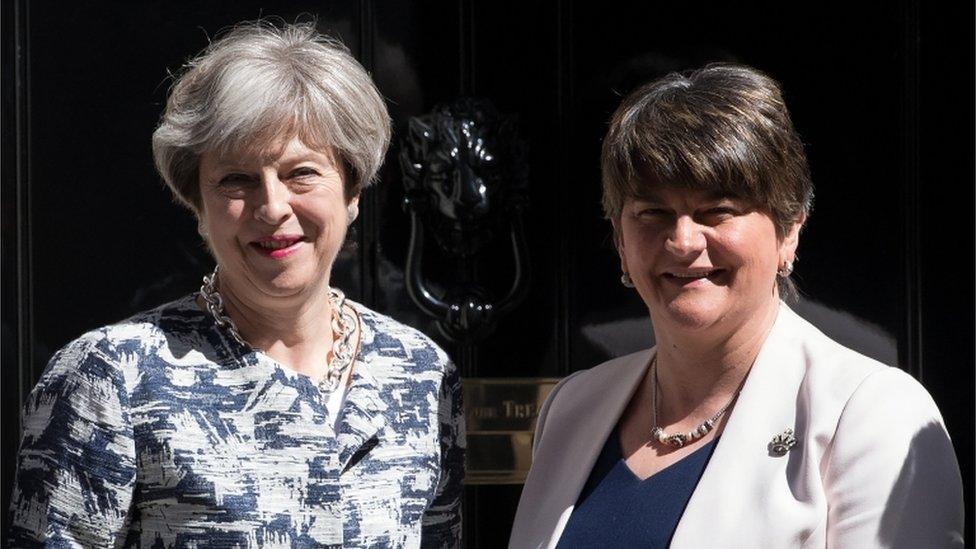Scots and Welsh launch DUP deal challenge
- Published
- comments

Theresa May and DUP leader Arlene Foster claim their deal will give the UK stable government during the Brexit process
The Scottish and Welsh governments have started a formal dispute process over the UK government's deal with the Democratic Unionist Party (DUP).
The prime minister signed an agreement last month which will see the DUP support her minority government.
The deal will see £1bn of additional funding go to Northern Ireland.
But the Scottish and Welsh governments argue that Barnett formula rules mean they should also be entitled to extra money.
The Scottish government said it would receive an additional £2.9bn if Barnett was applied, and the Welsh government £1.67bn.
The two devolved administrations have now asked the Treasury to invoke the formal dispute resolution process through the Joint Ministerial Committee.
A UK government spokesman said: "As we have made clear, this agreement is part of the government's commitment to support growth across all parts of the UK.
"Like previous Northern Ireland support packages, and the funding of over £1bn for city deals in Scotland and Wales, this funding is a targeted intervention to address a specific set of unique challenges.
"And as was the case for those previous interventions, this exceptional funding will be made outside of the Barnett funding system."
Scottish Secretary David Mundell had said ahead of the DUP deal being agreed that he would block any "back door funding" for Northern Ireland if it meant the other devolved nations missing out.
A Scotland Office source told BBC Scotland that it was "very relaxed" about the formal dispute resolution process being invoked, and that the UK government was confident it had operated correctly throughout.

What is the Barnett formula?
Since the late 1970s the Barnett formula has been used to determine annual changes in the block grant to each nation of the UK
When there is a change in funding for devolved services in England, for example health or education, the Barnett formula aims to give each country the same pounds-per-person change in funding
But the formula is not set out in law, and in practice the Treasury decides how to apply it
The UK government also provides other grants to devolved administrations outside of the block grant, which are not covered by Barnett
These grants are for less predictable demand driven spending, and are negotiated between the UK government and devolved administrations

But Scotland's finance secretary, Derek Mackay, said the Scottish government "fundamentally disagrees" with the way in which the Northern Ireland funding package has been allocated.
He added: "We have repeatedly made the point that all areas to which the £1bn funding package has been allocated are devolved matters and therefore the Barnett formula should apply.
"Despite this, the UK government argues that there should be no Barnett consequentials from this deal and refuses to acknowledge that Scotland, Wales and England will be short-changed by billions of pounds.
"That cannot be right - and the deal goes against the principles of the UK Treasury's own statement of funding policy."
He also argued that suggestions that the DUP funding arrangement was similar to previous funding for city deals in Scotland was "wrong and not in any way comparable".
'Fair and reasonable'
Mr Mackay added: "City deal funding is conditional on match funding from the devolved administrations' own budgets and also requires contributions from local authorities and other regional partners.
"In addition, the UK government has promised city deals for Northern Ireland on top of this £1bn of additional expenditure."
Mr Mackay said he was hopeful of reaching a "satisfactory resolution" which results in a funding allocation across Scotland, Wales and England that is "fair and reasonable for all".
His Welsh counterpart, Prof Mark Drakeford, said the UK government's actions meant it had failed to provide Wales with the resources it needed to invest in infrastructure, the NHS and the education system.
He added: "At a time when public services in Wales are under pressure as a result of the UK government's damaging and ongoing policy of austerity, it is only right that Wales gets its fair share of funding through the established rules of the Barnett formula.
"For all its faults the Barnett formula is supposed to be clear and rules based. It is simply inexcusable that the UK government is willing to "bypass" those rules."
The formal dispute process was last used in 2012, when the devolved administrations successfully claimed additional funds to match the money spent on the London Olympic games, external.
The DUP deal, which was signed two weeks after the general election resulted in a hung parliament, will see the party's 10 MPs back the Tories in key Commons votes.
At the time, DUP leader Arlene Foster insisted the "wide-ranging" agreement was "good for Northern Ireland and for the UK" and predicted it would deliver a stable government as the country embarks on the Brexit process.
The agreement will see a total of £1.5bn in funding - consisting of £1bn of new money and £500m of previously announced funds - to be spent over the next two years on infrastructure, health and education in Northern Ireland.